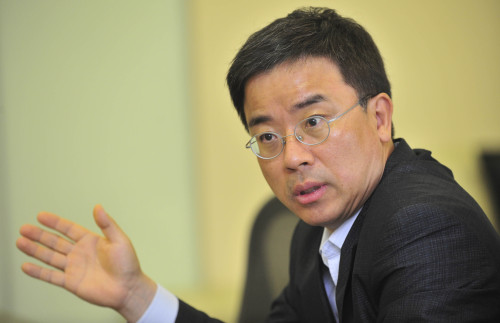Telecom giant forms international taskforce on global Wi-Fi roaming service
KT Corp., the country’s biggest fixed-line service operator, is casting an eye toward global markets on the strength of its innovative technologies.
Pyo Hyun-myung, president of the mobile business unit at KT, said the company is not merely looking to do business in other countries by buying shares of overseas firms, but also adding a touch of information to the telecom function.
“The merger and acquisition market is shrinking, meaning we need to upgrade the value of overseas business by presenting enterprise business solutions,” he recently told The Korea Herald.
“Many fresh business offers are flooding in from other foreign players who are learning the innovative side of KT,” said Pyo, who has been serving in the telecom sector for nearly three decades. “We’re now eying more business opportunities.”
As an exemplary case, a group called the Wireless Broadband Alliance, composed of 52 companies worldwide, recently launched a joint taskforce on Wi-Fi networks, according to Pyo.
 |
Pyo Hyun-myung |
WBA, participated in by AT&T, China Mobile, NTT DoCoMo, BT, Orange, T-Mobile, MACH and Boingo, is an organization created in 2003 for working together on wireless broadband service development. It also devises strategies on topics including standardization and roaming. KT was named a WBA board member this year.
“An era of Wi-Fi network roaming is soon to come and KT is in the lead,” he said.
Earlier this year, KT and Softbank announced the establishment of a joint venture which would offer cloud computing service to Japanese firms by the first half of next year. The two companies said the joint venture will be set up by September and that they would build a data center in Gimhae, South Gyeongsang Province, in October, providing data recovery services as well as cloud computing.
KT has also formed an alliance with China Mobile and NTT DoCoMo to stage Wi-Fi roaming zones in the three countries to construct a “smart belt” in Northeast Asia.
“I was the first to propose the wireless Internet roaming plan, suggesting that we will let their people use our networks here if they open their own networks.”
NTT DoCoMo immediately gave the green light and China Mobile singled out a unit to focus on the Wi-Fi business, said Pyo. Soon after, other big name companies like China Unicom and Softbank began establishing wireless networks in their countries.
KT aims to shift the focus of global collaboration to near-field communication technology that makes it simpler to go ahead with transactions and exchange digital content. The technology enables shoppers to have their mobile devices touch an electronics reader at the checkout counter to purchase goods and services directly from their bank accounts.
“If we continue to join hands with NTT DoCoMo, we could work further on services like wireless Internet roaming, mobile NFC, enterprise businesses and projects concerning next generation networks,” he said.
Pyo also said the latest version of the multinational open-platform mobile application store dubbed the Wholesale Application Community, which will contain millions of apps, will open in late August, opening the door to a target of 3 billion people.
Twenty-four telecoms around the world, which have a subscriber base of 3 billion in total ― two-third of the worldwide telecommunications subscriber base ― are core members of WAC, which kicked off in July last year.
“We’re currently cooperating on the WAC 2.0 project by dividing it to three areas ― mobile devices, applications and system,” Pyo said.
WAC plans to take less than the average commission of 30 percent, which is a method chosen by other mobile application store operators, he said.
“KT and its rivals SK Telecom, LG Uplus have all joined hands (on the WAC 2.0 project),” he said, adding that global electronics maker Samsung Electronics and LG Electronics have also announced their participation in the global apps store operation.
As for the company’s upcoming iPhone 5 partnership with Apple Inc., the KT president expressed strong confidence.
Although he indicated that the question should be directed to Steve Jobs, he noted KT’s past commitments which was shown to its global associates.
“We concentrate on maintaining the partnership once it is set. We’ve already showcased an example with HTC, collaborating better (compare to competitors) by giving active support,” he said.
For foreigners residing in Korea, KT has so far opened seven stores in Seoul and Gyeonggi Province, including in Itaewon, Jongno, Ansan, Dongducheon, Gwanghwamun, Gangnam and near Kyung Hee University, exclusively designed to serve customers from other countries, according to KT officials. It is also running eight branches located within the U.S. military bases.
It is also operating various online communication channels like Twitter (@olleh_expats) and a blog (expatblog.kt.com) to widen the pool of services for the group, said Pyo.
“Looking at the big picture, we wish to become the global leader of information and communication technologies and we will feature continuous efforts to make that happen by going forward with the possible strategic tactics,” said Pyo.
By Cho Ji-hyun (
sharon@heraldcorp.com)








